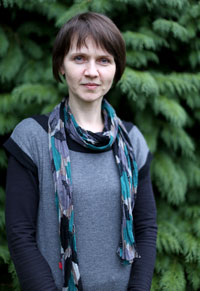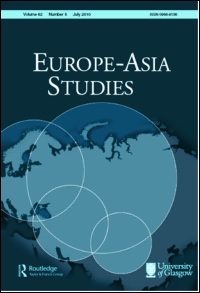Reinterpreting National Ideology in the Contemporary Urban Space of Astana
Posted on 27 February, 2018 in1989 after 1989 Cityscape Nation Building Post-Soviet Cities Soviet Union Urban Space

 Dr Nelly Bekus, alongside Kulshat Medeuova (Eurasian National University, Astana, Kazakhstan) has recently published the article Reinterpreting National Ideology in the Contemporary Urban Space of Astana in the Urbanities Journal. This forms part of a Special Issue: The Dreams and Nightmares of City Development Vol. 7 · No 2 · November 2017.
Dr Nelly Bekus, alongside Kulshat Medeuova (Eurasian National University, Astana, Kazakhstan) has recently published the article Reinterpreting National Ideology in the Contemporary Urban Space of Astana in the Urbanities Journal. This forms part of a Special Issue: The Dreams and Nightmares of City Development Vol. 7 · No 2 · November 2017.
The article analyses the way in which the Soviet legacy has been combined with practices of public representation of national ideology in the space of the new capital city of Kazakhstan, Astana. It examines how cultural and political elites exploit various archaic elements of the traditional imagery of the nation in the context of modern state-building. Referring to various examples in cityscape the article aims to show how the national ideology handles tradition not as a coherent corpus of ‘inheritance’, but as a reservoir of potential symbols, which can be used creatively for the fashioning of a national image of the capital city both in the international and in the domestic arena.
→ Download article: Reinterpreting National Ideology in the Contemporary Urban Space of Astana
Programme now available for our conference on State Socialism, Heritage Experts and Internationalism
Posted on 20 October, 2017 inArea Studies Communism East Asia Eastern Europe End of Yugoslavia Globalisation Heritage Heritage Experts Latin America Memory Nation Building Post Socialism Post-Soviet Cities South Africa

State Socialism, Heritage Experts and Internationalism in Heritage Protection after 1945
21-22 November 2017
Location: Reed Hall, University of Exeter, UK
Join us for our conference exploring the rising contributions of socialist and non-aligned actors to the development of heritage at both domestic and international levels.
CONFERENCE SYNOPSIS
Histories of heritage usually perceive their object of study as a product of western modernity, and exclude the socialist world. Yet, understood as a cultural practice and an instrument of cultural power, and as a “right and a resource”, heritage has played important roles in managing the past and present in many societies and systems. In the postwar period, preservation became a key element of culture in socialist and non-aligned states from China, the Soviet Union, and the Eastern Bloc to Asia, Latin America and Africa. Attention paid to the peoples’ traditions and heritage became a way to manifest the superiority and historical necessity of socialist development. However, the contribution of socialist states and experts to the development of the idea of heritage is still to be fully excavated.
The conference aims to understand the rising contributions of socialist and non-aligned actors to the development of heritage at both domestic and international levels. This phenomenon was in part the result of country-specific factors – such as a reaction to rapid industrial development; the destruction of both the Second World War or wars of national liberation; and the necessity to (re)-invent national traditions on socialist terms. But it was also due the growth of a broader international consensus on international heritage protection policies – in which socialist and non-aligned states and their experts played an important role. To this end, the conference will also address the relationship between socialist conceptions of heritage and those found in the capitalist world: to what extent can we discern the convergence of Eastern and Western dynamics of heritage discourses and practices over the second half of the twentieth century? To what degree did heritage professionals from socialist states play a role in the formation of the transnational and transcultural heritage expertise? To what extent did heritage still play a role in Cold War competition? Socialist states claimed that their respect for progressive traditions and material culture distinguished their superior methods of development from that of the capitalist world. Non-Aligned countries often attempted to blend aspects of socialist and capitalist logics of cultural heritage politics.
CONFERENCE PROGRAMME
Day 1 – 21 November
08.45-09.15 Registration
09.15-09.30 Introduction
09.30-10.30 Panel 1: Transnational Circulations of Heritage Concepts and Ideas (Part 1)
Chair James Mark
Discussant Michael Falser
Nikolai Vukov (Bulgarian Academy of Sciences) Ethnographising the Past, Ideologising the Present: Traditional Heritage as an Ideological Resource and International Asset in Eastern Europe after 1945
Yao Yuan (Nanjing University) International Factors in Shaping Chinese Heritage Conservation Policy
10.30-10.45 Refreshment Break
10.45-12.00 Panel 1: Transnational Circulations of Heritage Concepts and Ideas (Part 2)
Chair Corinne Geering
Discussant Nelly Bekus
Marko Spikic (University of Zagreb) Between Exceptionalism and Internationalism: Ethics and Politics of the Conservation System in People’s Republic of Croatia of the 1950s
Pablo Gonzalez (University of Lisbon) A Rebel Heritage for the Cuban Revolution: Socialist Internationalism, Art and Soviet Influence
12.00-13.00 Keynote Lecture: Stephen Smith (University of Oxford) Heritage in Contention: the Soviet Union and China after 1945
13.00-14.30 Lunch
14.30-16.00 Panel 2: International Organisations and Socialist Heritage
Chair Kate Cowcher
Discussant Nikolai Vukov
Nelly Bekus (University of Exeter) Tracing Multiple Logics in Soviet Heritage-Making: Pan-Soviet, National and International Agencies of Cultural Power
Corinne Geering (Justus-Liebig-University Giessen) World Heritage beyond UNESCO: Soviet Approaches to World Heritage before 1988
Emanuela Grama (Carnegie Mellon University) International mediations: UNESCO visits to Romania at the end of the Cold War or heritage as a right to place
16.00-16.15 Refreshment Break
16.15-17.15 Panel 3: South East Asia and Socialist Heritage
Chair Natalia Telepneva
Discussant James Mark
Michael Falser (Heidelberg University – Université Bordeaux-Montaigne) Cold War and non-aligned heritage politics in South and South-East Asia
Alicja Gzowska (University of Warsaw) One man’s dream? Polish conservation experts in Vietnam
19.00 Drinks Reception – Devon and Exeter Institution
20.00 Conference Dinner – Rendezvous
Day 2 – 22 November
09.00 – 10.30 Panel 4: The Development of Socialist Ideas of Heritage in Africa (Part 1)
Chair Nelly Bekus
Discussant Paul Betts
Kate Cowcher (University of Maryland) Origin Myths and Incarcerations: Ethiopia’s National Museum amidst socialist revolution
Piotr Marciniak (Poznan University of Technology) From Warsaw to Faras. The Polish School of Reconstruction and Conservation of Monuments and Sites: People, Doctrine and History
Natalia Telepneva (University of Warwick) The Soviet-Somali Archaeological Expedition and the Global Struggle for the Horn of Africa
10.30-10.45 Refreshment break
10.45-11.45 Panel 4: The Development of Socialist Ideas of Heritage in Africa (Part 2)
Chair Michael Falser
Discussant Marko Spikic
Nadine Siegert (University of Bayreuth) (Re)activated heritage. State-sponsored socialist propaganda and architecture in the Luanda cityscape
Nina Díaz Fernández (University of Ljubljana) Yugoslav Experts and the Protection of Monuments in the Third world
11.45-13.00 Round Table
Paul Betts (University of Oxford)
Michael Falser (Heidelberg University – Université Bordeaux-Montaigne)
James Mark (University of Exeter)
13.00 Farewell Lunch
Conference Convenors:
 Professor James Mark and Dr. Nelly Bekus, University of Exeter and 1989 after 1989
Professor James Mark and Dr. Nelly Bekus, University of Exeter and 1989 after 1989
Dr. Michael Falser, Cluster of Excellence Asia and Europe in a Global Context, Heidelberg University
Dr Ezster Gantner, Herder Institute
[Top]Ideological Recycling of the Socialist Legacy. Reading Townscapes of Minsk and Astana
Posted on 8 September, 2017 inArea Studies Nation Building Post Socialism Post-Soviet Cities Socialism
 Nelly Bekus’ article Ideological Recycling of the Socialist Legacy. Reading Townscapes of Minsk and Astana has recently been published in the Journal for Europe-Asia Studies, Volume 69, Issue 5, July 2017.
Nelly Bekus’ article Ideological Recycling of the Socialist Legacy. Reading Townscapes of Minsk and Astana has recently been published in the Journal for Europe-Asia Studies, Volume 69, Issue 5, July 2017.
Her article addresses the ways in which the systemic transformation of the former Soviet republics has been reflected in urban development in two capital cities, Minsk (Belarus) and Astana (Kazakhstan). Changes taking place in these capitals have been analysed through the prism of an ideological recycling of the socialist legacy, a concept that permits exploration of which aspects of the socialist legacy have been jettisoned and which retained, in the process of formation of a capital. The article explores the nationalising strategies adopted by Belarus and Kazakhstan and reified by various practices, including those involving the recasting of cities. These strategies, however, are analysed not as inventions of post-Soviet regimes, but as forms of structural continuity.
→ Ideological Recycling of the Socialist Legacy. Reading Townscapes of Minsk and Astana
[Top]





